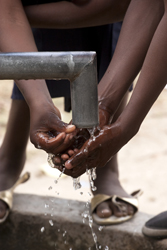The case for African water research
World governments have fallen short on their promise to meet Millennium Development Goals (MDGs) with respect to water. New technologies and systems must be developed and adopted, particularly with the support of African stakeholders. The EU-funded project 'Action to promote involvement of African water researchers in the Framework Programme' (African WATER) supported the concerned stakeholders to embark on research initiatives in order to help achieve these MDGs. Armed with this ambitious objective, the project developed novel approaches, cutting-edge methods and new knowledge management systems, in addition to helping African researchers join EU projects and other global initiatives. It effectively enabled African stakeholders to identify and overcome key challenges in their continent in order to achieve their goals. The project's first step was to develop and distribute training and communication tools, such as a promotional film and events, as well as to establish a project website. It exploited existing scientific networks to involve researchers and build on these networks to create a strong database. These efforts were promoted through different conferences, meetings and newsletters. Moreover, African WATER conducted training workshops and meetings with the public and private sectors in several African countries to identify priorities for water research. This concerned the development and application of science and technology (S&T) to facilitate Africa’s socioeconomic transformation, covering water quality, sanitation and management. The project worked on overcoming low participation of African researchers in European initiatives, lack of awareness and weak access to information. Other obstacles included high travel costs between Africa and Europe, as well as resistance of consortia to involve African partners in EU projects. The project produced recommendations to pre-empt the barriers and drawbacks to participation of African stakeholders in these initiatives. It developed a smart programme to increase African representation in foreign-led projects and encourage participation in scientific events. The positive effects on African well-being through the availability of more water to communities may be immeasurable in the long run.



